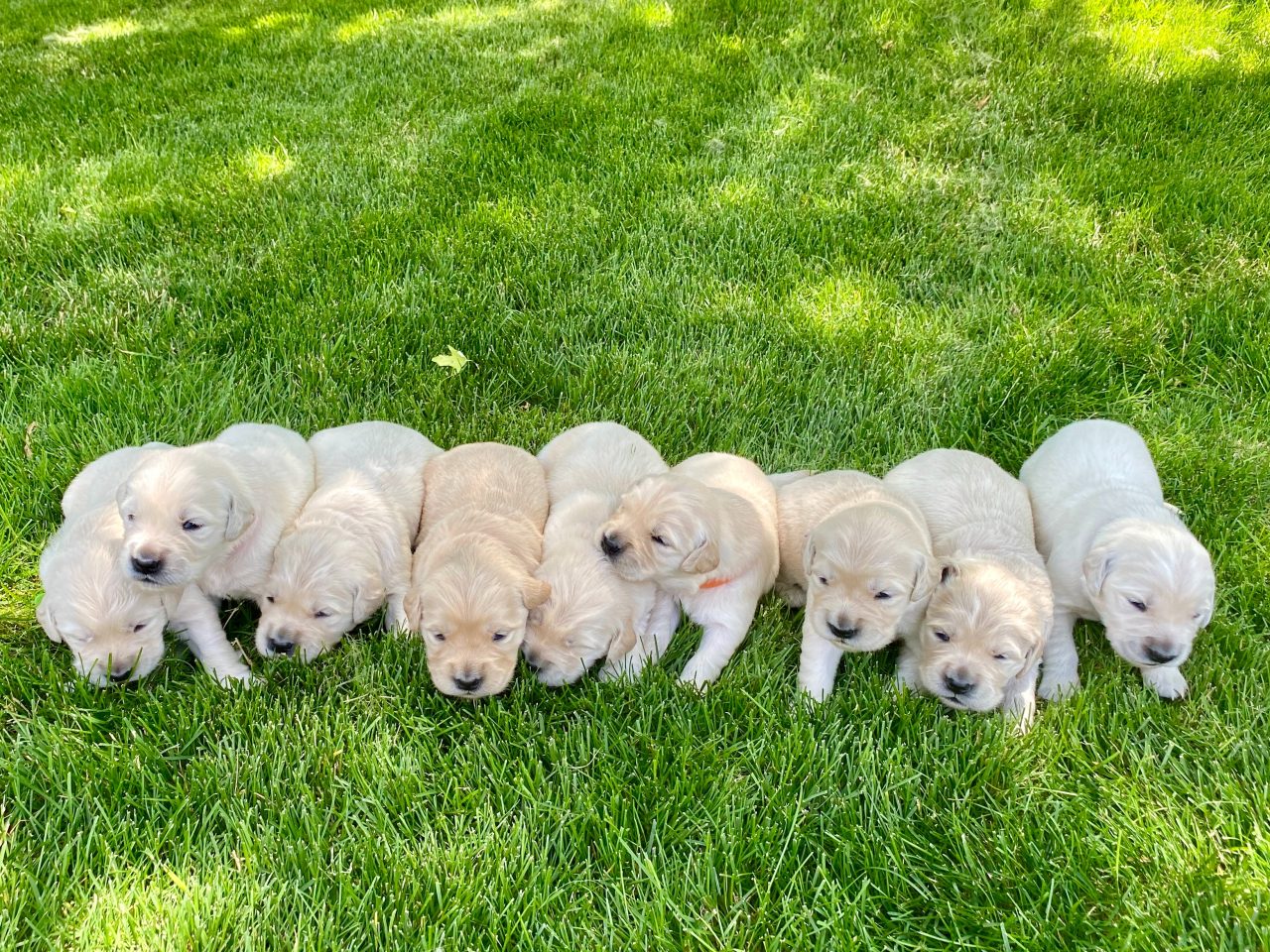A veterinarians guide to choosing the best Golden Retriever breeder. If you’re considering adding a Golden Retriever to your family, it’s important to find a reputable breeder. Golden Retrievers are one of the most popular dog breeds in the world. Known for their friendly and loving personalities, these dogs make excellent family pets. In this article, we’ll discuss how to choose the best Golden Retriever breeder.
Table of Contents
1. Research the Breed
Before you start looking for a breeder, it’s important to research the breed. Learn about their personality traits, exercise needs, grooming requirements, and health issues are. Make sure a Golden Retriever is the right fit for your family.
This information will help you Choose a Golden Retriever Breeder because it helps set you up with the knowledge you need to interpret what a potential breeder is telling you. For example if a breeder tells you that they don’t check for Hip Dysplasia in their breeding dogs because Goldens don’t have the disease, you will know they are wrong. This would not be a breeder for you.
2. Ask for Referrals
Ask friends, family, and your veterinarian for referrals to reputable Golden Retriever breeders. They may be able to recommend breeders they’ve had positive experiences with.
If you know someone with a Golden you absolutely love, ask them where they got their dog.
Ask breeders where they get their dogs and why. As you call different breeders it is expected you will ask about the bloodlines of the dogs they are breeding. If you hear about the same breeder more than once this might be someone you should contact.
3. Check for Accreditation
Look for a Golden Retriever Breeder who is accredited by the American Kennel Club (AKC), USDA and/or other reputable organizations.
It is not mandatory for a Golden Retriever breeder to be accredited by either the American Kennel Club (AKC) or the United States Department of Agriculture (USDA). However, being accredited by these organizations can be an indication that the breeder follows ethical breeding practices and has high standards for the care and treatment of their dogs.
The AKC is a national organization that promotes responsible dog breeding and provides breed standards for different dog breeds. They offer breeder referral services and offer the AKC “Breeder of Merit” program that recognizes breeders who go above and beyond on the health, type and temperament of their dogs. Breeders who are part of that program are committed to following the AKC’s guidelines for breeding and raising puppies as well as testing for inherited health conditions.
AKC has a list of Breeders of Merit on their website who are part of that program. Unfortunately you cannot search the list by breed (only state and last name) so it may be easier to search for a Golden retriever breeder your have already found to see if they are part of the program.
On the other hand, the US Department of Agriculture (USDA) oversees the Animal Welfare Act, which sets minimum standards for the care and treatment of animals in commercial breeding facilities. Breeders who sell puppies as a business and have more than three breeding females are required to be licensed and regulated by the USDA. If the breeder you are looking at meets the requirements for needing a license and they do not have one this is a red flag. Where else are they cutting corners?
While AKC or USDA accreditation is not mandatory, it can be a useful indication that a breeder is reputable and follows ethical breeding practices. As a prospective buyer, it’s important to do your own research and due diligence before choosing a breeder to ensure that the puppies you’re considering come from a reputable source with a commitment to the health and well-being of their dogs.
4. Ask About Health Screenings
Golden Retrievers are susceptible to certain health issues that can be inherited, and responsible Golden Retriever breeders will conduct specific health screenings to ensure the health and well-being of their dogs and the puppies they produce. According to the Golden Retriever Club of America, all US breeding Golden Retrievers should be screened for:
Hip dysplasia:
Hip dysplasia is when an abnormal socket for the hip joint develops in the dog. It is inherited and believed to be influenced by multiple genes. It cannot be detected in very young puppies so the adult parents should be screened by X-ray for the disease.
Screening for Hip Dysplasia should be done at 24 months old, before breeding the first time. Two organizations provide evaluation of the x-rays are the Orthopedic Foundation for Animals (OFA) and the University of Pennsylvania (PennHip).
It is recommended that only dogs with OFA “Good” to “Excellent” Hips be bred. However, occasionally there is a dog that is exceptional in other areas where breeding may be justified. In that case, the other parent should have the best hips possible.
Elbow dysplasia:
This is a condition where the elbow joint does not develop properly, leading to arthritis and pain. It is less common than Hip dysplasia but still can effect up to 10% of Golden Retrievers. The primary clinical sign is lameness in a front leg or both front legs.
X-rays can also detect this condition. OFA also offers evaluation and certification of the elbows of dogs 24 months old or older. Many Golden Retriever breeders check earlier for a preliminary result but confirmation at 24 months is ideal.
Dogs with Elbow Dysplasia should not be bred.
Eye disease
Golden Retrievers can develop several eye diseases such as cataracts, retinal dysplasia, and progressive retinal atrophy (PRA), among others.
Yearly eye exams by a certified veterinary ophthalmologist can detect these conditions. Reports by an ophthalmologist are good for 12 months and then should be repeated, so look for an up to date evaluation.
There is also a Genetic Test for PRA in Golden Retrievers that can be done. However DNA testing should not replace the eye exam because of other possible eye conditions Goldens can have.
Heart health:
Golden Retrievers can develop heart diseases such as aortic stenosis and subaortic stenosis. These conditions can be detected through a heart exam, which includes auscultation and an echocardiogram.
Yearly Eye exams by a certified veterinary cardiologist is recommended to screen for these conditions. Reports from a cardiologist are also good for 12 months and then should be repeated. A great Golden Retriever breeder will have an up to date evaluation.
Genetic testing:
Some genetic tests can help identify carriers of genetic disorders that can be found in some families of Golden Retrievers, such as Progressive Retinal Atrophy (PRA) and Ichthyosis.
It is not necessary for a Golden Retriever breeder to DNA test every breeding dog for every possible disease. Some of these diseases are very rare in Golden Retrievers. So if your breeder has not done any genetic tests but has completed the hip, elbow, heart and eye exams that is enough to tell you they are doing the right testing.
However, some breeders go above and beyond. So if a Golden Retriever breeder shows you some results this will help you know what test they could have done.
There are several DNA tests available for Golden Retrievers that can provide important information about a dog’s genetic health and traits. The PRA and Ichthyosis tests would be the most helpful since less than 95% of the Goldens test clear according to Embark. Some of the available DNA tests for Golden Retrievers include:
- PRA Tests – There are several tests for Progressive Retinal Atrophy, a genetic eye disease that can lead to blindness. There are at least 3 known gene mutations in Golden Retrievers that can cause the disease. The test is offered by several labs, including UC Davis, OptiGen and Embark.
- Golden Retriever Ichthyosis Test – This test screens for Ichthyosis, a genetic skin disease that can cause dry, scaly skin and other skin-related issues. The test is offered by several labs, including OptiGen, UC Davis, and GenSol Diagnostics.
- Golden Retriever Muscular Dystrophy Test – This test screens for Muscular Dystrophy, a genetic disease that causes progressive muscle weakness and muscle wasting. The test is offered by the Vetgen, pawprints, and is part of the Embark panel.
- Congenital Myasthenic Syndrome (CMS) in Golden Retrievers – Congenital myasthenic syndrome is a name for a group of inherited nerve and muscle diseases. They manifest as progressive muscle weakening that worsens with exercise. The test is offered by the University of California, Davis Veterinary Genetics Laboratory.
- Degenerative Myelopathy (DM) – DM is an inherited nerve disease of dogs characterized by gradual muscle wasting and loss of coordination. This usually is first noticed in the hind legs. The test is offered by the University of California, Davis Veterinary Genetics Laboratory.
- Neuronal Ceroid Lipofuscinosis (NCL) – NCL results from the accumulation of material in the nerves of the brain and spinal cord. Clinical signs include changes in behavior, blindness, and a loss of coordination. The test is offered by the University of California, Davis Veterinary Genetics Laboratory.
- Sensory Ataxic Neuropathy (SAN) – SAN is a progressive nerve disorder of the nerves that control muscles. Dogs have involuntary muscle movements and abnormal posture. It affects both males and females. The test is offered by the University of California, Davis Veterinary Genetics Laboratory.
Some of the labs that offer these tests for Golden Retriever breeders include OptiGen, GenSol Diagnostics, University of California, Davis Veterinary Genetics Laboratory, Canine DNA Services, Embark, and Wisdom Panel. It’s important to note that not all labs offer every test, and the cost and accuracy of tests may vary between labs. UC Davis has a panel specific to Golden Retrievers that tests for all of the above except for muscular dystrophy. The Embark panel tests for all of the above.
Remember, just because a dog is a “carrier” of a recessive genetic disease does not mean they should not be bred. All it really means is they should not be bred to another carrier. For example, If mom is a PRA “carrier” then dad should be “normal”. This keeps any puppies from getting PRA. It is important that breeders continue to breed carriers if they have other desirable traits because it keeps the gene pool large and decreases the chances of other genetic diseases.
Conclusion on health screening
By conducting these health screenings, a Golden Retriever breeder can identify any potential health issues in their dogs and take appropriate steps to reduce the possibility of inheritance of those health problems in future litters. This can help to ensure that the puppies they produce are healthy and have the best possible start in life. As a prospective buyer, it is essential to ask the breeder about the health screening results of the parent dogs before making a decision.
5. Evaluate the Qualifications of the Breeding Dogs
A Golden Retriever breeder should be breeding the best examples of the breed in order to maintain (or improve) the standards of the breed.
The only way to know that this is true, beyond the breeder’s own opinion is to look for a Golden Retriever breeder who takes the time to compete with their dogs. This is an expensive endeavor and adds significant expense to breeding. Dogs that compete and do well will have titles after their names. Ask the Golden Retriever Breeder what titles their breeding animals have.
Golden Retrievers can earn several different AKC (American Kennel Club) titles, which recognize their achievements in various activities and events. Here are some of the most common AKC titles that Golden Retrievers can earn:
- AKC Champion (CH): This title is earned by dogs that have competed and won in conformation shows, which evaluate a dog’s physical appearance and structure according to the breed standard.
- Companion Dog (CD): This title is earned by dogs that have completed the AKC’s basic obedience trial, which tests a dog’s ability to perform basic obedience commands such as sit, stay, and heel.
- Companion Dog Excellent (CDX): This title is earned by dogs that have completed the AKC’s advanced obedience trial, which tests a dog’s ability to perform more complex obedience commands and exercises.
- Utility Dog (UD): This title is earned by dogs that have completed the AKC’s most advanced obedience trial, which includes even more complex exercises such as scent discrimination and directed jumping.
- Junior Hunter (JH): This title is earned by dogs that have completed a minimum of four qualifying scores in AKC-sanctioned hunting tests, which evaluate a dog’s ability to retrieve game in the field.
- Senior Hunter (SH): This title is earned by dogs that have completed a minimum of five qualifying scores in AKC-sanctioned hunting tests at the Senior level, which evaluate a dog’s more advanced skills in retrieving game in the field.
- Master Hunter (MH): This title is earned by dogs that have completed a minimum of six qualifying scores in AKC-sanctioned hunting tests at the Master level, which evaluate a dog’s expert skills in retrieving game in the field.
These are just a few of the AKC titles that Golden Retrievers can earn. There are also titles available for other activities, such as agility, tracking, and dock diving. If you don’t know what the titles mean, ask. A great Golden Retriever breeder will be happy to brag about their dog’s achievements, and rightly so.
6. Visit the Breeder

Visit the Golden Retriever breeder in person to see the conditions the dogs are kept in. Look for signs of good health and socialization, such as a clean environment, friendly dogs, and proper exercise and feeding schedules.
The breeder should allow you to interact with the dogs, play with the puppies, and ask questions. Meeting the parents of the puppy you are considering is ideal. At the very least you should be allowed to meet the mother, but meeting both mother and father is ideal. It is not uncommon for breeders to breed their female dogs to the male dogs owned by other breeders. In this case dad may not be available (this is not of concern).
Meeting the parents allows you to get an idea of what your Golden Retriever puppy may look like and what their personality might be. Meeting all the females the breeder has may help you know which one you want to be the mother of your new puppy.
Some things you may see that would raise a flag (but are not definitive signs of a poor breeder):
- A breeder who breeds more than 2 breeds of dogs. It is hard enough to be an expert on only one breed. Trying to breed the best of the best with more than two breeds is not likely to happen. I am sure there are exceptions but keep this in mind. In the best case these breeders may not have the best quality puppies, and worst case may be a sign they are a puppy mill.
- Female dogs are in poor condition. It is ok for a female to be a little on the thin side and have a poor hair coat after raising a litter of puppies. This is normal, after all it take a lot of effort and resources to feed the pups. However, they should not have noticeable signs of disease, patchy fur, injuries, and should not show signs of neurotic behavior like circling in their kennel non-stop. Look at the females who do not have litters. They should be friendly (not cowering in a kennel), a healthy weight, and have a normal golden hair coat.
- A breeder who will not show you where the dogs are kept. They bring the dogs to you. They may be fine but it makes me wonder what they are hiding.
- The breeder has lots of available puppies ready to go today. The best breeders have waiting lists or pre-sell their litters. Lots of puppies makes you wonder why they don’t have demand for their dogs.
- Puppies are not vaccinated or dewormed prior to adoption or have never seen a veterinarian. Puppy health care and examinations are very important. You need to be sure that your new puppy is free from any diseases or congenital issues such as heart conditions. (Quick veterinary note: Puppies can still have a few worms even after deworming a couple times; worms are tricky. This is not a sign you got your pup from a “bad breeder”.)
Do not be concerned by a Golden Retriever breeder who keeps some of their dogs in runs part-time. I know several fantastic breeders who have kennel buildings and rotate their dogs through the house, kennel, and yards so they all get exercise and family time. Can you imagine having 10 Golden Retrievers in the house with you all the time. Plus the mess that puppies make is much easier to clean in runs.
Ask how they socialize their puppies. Although not absolutely necessary, having kids, different adults, and other dogs and pets (cats) around is great. It gets the puppies used to different families they may interact with after adoption. The earlier socialization starts the better.
7. Check for a Contract
A reputable Golden Retriever breeder will provide a contract outlining their policies and procedures. The contract should include information about health guarantees, return policies, and spaying/neutering requirements.
8. Make Sure They Provide Follow-up Support
A great Golden Retriever breeder will provide follow-up support after you take your new puppy home. They should be available to answer any questions you have and provide guidance as needed.
9. Prepare to Wait
Expect that the process of finding a perfect Golden Retriever breeder for your new family member may take a while. You might find the perfect breeder tomorrow but be told they don’t have puppies available now. The best breeders often have waiting lists of people that want puppies. That is actually a great sign even though it is disappointing. In this case it is worth getting on their waiting list.
Conclusions on Finding a Great Golden Retriever Breeder

It is worth noting that by the time you take into account show expenses, testing expenses, medical care, food expenses, and labor costs, a Golden Retriever Breeders who is “doing it right”, make very little money in the end on their dogs. For information on cost, check out our post on How Much Does a Golden Retriever Cost.
In conclusion, choosing a Golden Retriever breeder requires some research and due diligence. Look for a breeder who is has titled dogs, has a clean and safe environment, provides health screenings and medical care to the puppies, and has a contract. A good breeder will also provide follow-up support and be available to answer any questions you have. By finding a reputable breeder, you’ll be much more likely to have a happy and healthy Golden Retriever for years to come

